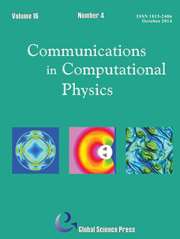Article contents
Numerical Optimization of a Walk-on-Spheres Solver for the Linear Poisson-Boltzmann Equation
Published online by Cambridge University Press: 03 June 2015
Abstract
Stochastic walk-on-spheres (WOS) algorithms for solving the linearized Poisson-Boltzmann equation (LPBE) provide several attractive features not available in traditional deterministic solvers: Gaussian error bars can be computed easily, the algorithm is readily parallelized and requires minimal memory and multiple solvent environments can be accounted for by reweighting trajectories. However, previously-reported computational times of these Monte Carlo methods were not competitive with existing deterministic numerical methods. The present paper demonstrates a series of numerical optimizations that collectively make the computational time of these Monte Carlo LPBE solvers competitive with deterministic methods. The optimization techniques used are to ensure that each atom’s contribution to the variance of the electrostatic solvation free energy is the same, to optimize the bias-generating parameters in the algorithm and to use an epsilon-approximate rather than exact nearest-neighbor search when determining the size of the next step in the Brownian motion when outside the molecule.
- Type
- Research Article
- Information
- Copyright
- Copyright © Global Science Press Limited 2013
References
- 11
- Cited by


